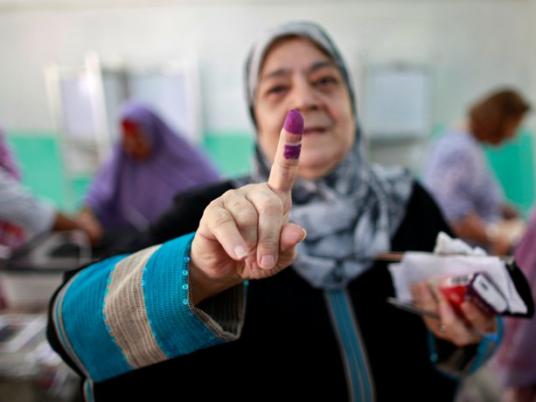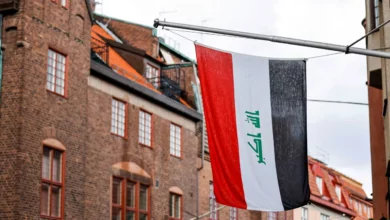Without exception, all Egyptian newspapers on Thursday detail the proceedings of the historic trial of former President Hosni Mubarak, his two sons, interior minister and six aides. These stories fill the pages as they attempt to record history, in an event equally as important as the day Mubarak was ousted.
The front pages feature pictures of Mubarak and the rest of defendants sitting behind the bars of a cage in the court. Both the privately owned Al-Tahrir and the state-run Al-Akhbar have nearly the same front page, with similar captions.
Al-Tahrir writes “Long live the revolution” on Mubarak’s picture, describing him as “indolent,” older son Alaa as “nervous,” and younger son Gamal as “arrogant.”
Al-Akhbar also calls Gamal “the arrogant,” describing Alaa as “the greedy” and Adly and his aides as “the killer and his gang.”
Newspapers compete for the main headline that can best describe this unprecedented event that has stunned not just Egyptians but the whole world. The main headline of the state-run daily, Al-Ahram reads, “Mubarak and his regime in the grip of justice,” while the privately owned daily Al-Shorouk uses a verse from the Quran: “That you may be a sign to those who come after you.”
Al-Tahrir runs, “Egypt’s pharaoh in his cage”; Al-Akhbar similarly writes, “Mubarak in the cage … Now the revolution has succeeded”; the liberal Wafd Party’s daily, Al-Wafd has, “The gang’s leader … in the cage.”
Newspaper columnists all express their joy that the revolution is shocking the entire world with its peacefulness and adherence to the fair of law, even in trying a tyrant violated the rights and dignity of his people for 30 years.
Many columnists criticize Mubarak’s surprisingly apathetic appearance.
“All attempts to glorify the pharaoh had failed, with Mubarak’s apathetic look in his eyes, his insistence on dying his hair until the end to remind us of his persistence standing in the face of natural laws, his insistence on entering the court on a medical stretcher, in order to remind people of the detainees that used to be tied with handcuffs to the worn beds of hospitals, and finally, his wish to appear indifferent and undefeated after what happened,” wrote Bilal Fadl, in his column in Al-Tahrir entitled “The pharaohs’ nose.”
Fadl adds that he knew the regime really fell when he saw Mubarak picking his nose during the court session, saying, “From today, this will be the fate of any tyrant who kills his people, steals their money and insults their dignity.”
In his column entitled, “The surprise, Mubarak’s strength,” Al-Ahram’s columnist Salah Montasser discusses Mubarak’s unexpected strength.
“The true surprise in the trial was Mubarak’s appearance as much stronger than what the medical reports had been saying, as he appeared with dyed hair, the watch on his left wrist and his normal face that didn’t show any signs of weakness; even his unique voice sounded powerful most of the time.”
While most columnists are optimistic about the trial, Al-Tahrir Editor-in-Chief Ibrahim Eissa expresses his fear that the trial might be the country’s rulers’ way of shutting out any opposition in the near future.
“I am afraid that we may pay a high price for this trial. The people running the country’s affairs could pass bad laws and decisions not based on consensus, leading to the government’s failure. Then they can reply to any criticism or opposition by saying, 'What do you want from us? Didn’t we put Mubarak on trial for you and put him in a cage for all of you to watch? What more do you want than this?'” writes Eissa in his column under the headline, “The price of the historic scene.”
Al-Ahram’s Sameh Abdallah also tries to be realistic about the fervor that accompanies the trial saying.
“The trial in itself doesn’t necessarily portend retribution or execution. Egyptians don’t understand that the trial of Mubarak doesn’t automatically lead to conviction, but it can actually end with the innocence of the defendants.”
Abdallah adds that the prosecution has to prove that Mubarak “unequivocally” ordered the killing of protesters. Thus, he writes, “the revolution’s goals should not be reduced to the trial of one person, even if that person is the former president.”
In his column in Al-Shourouk daily, political science professor at Cairo University Amr Hamzay, writes about the impact of the trial on the rest of the Arab and African countries ruled by dictators.
He rhetorically wonders about the Syrian President Bashar al-Assad, who has reportedly been killing his own people in protests: “Is he scared or worried? Will he reconsider his criminal way of dealing with his people, afraid of a similar fate as Mubarak?”
“The same concerns must also be present in Libya and Yemen, where their criminal rulers are also massacring and torturing the people. Will Qadhafi, Assad and Saleh try to find a compromise in order to avoid Mubarak’s end?”




